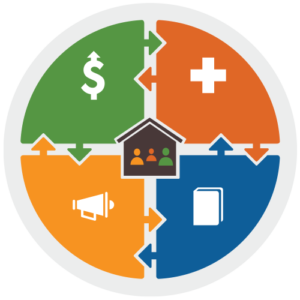Our Model

The LIA Development Model
Our integrated development model cultivates local leadership, and requires community ownership and sustainable solutions to bring about transformation. Linking In Aid, in partnership with local leadership, determines communities’ most significant needs and then trains, supports, and works alongside community members to meet those needs for the long-term. We go beyond relief in that each program aims to not just meet the urgent needs of a community, but to see lasting change.

Economic Empowerment
Earning capacity and savings are the basis for physical poverty alleviation. When one is able to provide for their family, they have more dignity and a better understanding of their self-worth. We focus on economic empowerment opportunities that promote self-sufficiency and innovation to create value in a given economy.
Initiatives include:
- Catalyzing community-based savings and loan groups
- Providing training on saving and work ethics
- Administering structured skills training for improved job prospecting
- Providing entrepreneurship training with seed money to start independent businesses in urban contexts
- Administering agricultural development training in rural contexts
- Facilitating cooperatives to improve economies of scale for small-scale farmers
- Establishing small-scale manufacturing to scale product production.

Social Engagement
Social engagement is the basis for breaking the poverty cycle. Nothing changes when nothing is changed. We work to equip and walk alongside communities as they identify the structures that perpetuates their circumstances. Furthermore, we encourage our partners to fully utilize their unique role in the community by advocating for its most vulnerable members.
Initiatives include:
- Mobilizing communities to represent and protect themselves from systems that oppress them
- Organizing communities for relevant leadership, accountability, ownership, and feasible transformational development initiatives
- Giving voice and representation to the most marginalized citizens
- Conducting participatory needs assessments and joint planning with stakeholders
- Forming community-based cooperatives and support groups to initiate and expand transformational development initiatives
- Building the capacity of local government bodies to ensure effective service delivery and customer satisfaction
- Coordinating efforts with local government bodies to provide access to basic health, education, and land issues
- Creating representative steering committees to ensure sustained impact after LIA has phased out

Community Health
Health is the basis for life. Each and every community we serve has a specific emphasis on disease prevention, health promotion, and care. The community plays a vital role in identifying the areas of greatest need and implementing health programs that build upon existing assets, capacity, and the established health network.
Initiatives include:
- Establishing scalable and sustainable community clinics
- Establishing scalable and sustainable WASH facilities (water supply, sanitation, and hygiene)
- Mobilizing local volunteers to educate and prevent HIV transmission from mothers to children
- Implementing targeted nutrition programs for children under five and single mothers
- Conducting community training sessions on health, hygiene, and disease prevention
- Capacity-building and networking with local government health providers to improve access to primary health care services
- Home visits conducted by trained community members to evaluate and promote safe household hygiene practices

Education
Education is the basis for development. All our initiatives include community-wide seminars and educational interventions targeting the identified needs, assets, and capacity within a community.
Initiatives include:
- Establishing sustainable and quality elementary schools
- Leadership training for local partners
- Tutoring and education for street children
- Structured tutoring for at-risk children
- Community health trainings focused on disease prevention and health promotion
- Providing economic empowerment trainings
- Providing English as a second language courses
- Providing relevant focus-group based trainings per identified training needs
